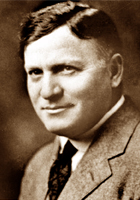Max Ehrmann Biography
Max Ehrmann (September 26, 1872 – September 9, 1945) was an American writer, poet, and attorney from Terre Haute, Indiana, widely known for his 1927 prose poem "Desiderata" (Latin: "things desired"). He often wrote on spiritual themes.
Ehrmann was of German descent; both his parents emigrated from Bavaria in the 1840s. Young Ehrmann was educated at the Terre Haute Fourth District School and the German Methodist Church.
He received a degree in English from DePauw University in Greencastle, Indiana, which he attended from 1890 to 1894. While there, he was a member of Delta Tau Delta's Beta Beta chapter and was editor of the school newspaper, Depauw Weekly.
Ehrmann then studied philosophy and law at Harvard University, where he was editor of Delta Tau Delta's national magazine The Rainbow, circa 1896.
Go placidly amid the noise and haste,
and remember what peace there may be in silence.
As far as possible without surrender
...
A clear, cool night. I have been reading, but the thoughts of man do not solace me.
I raised the curtain and looked at the moon, clear and silvery; and I brushed some of the unrest out of my mind.
...
Let me do my work each day; and if the darkened hours of despair overcome me, may I not forget the strength that comforted me in the desolation of other times.
May I still remember the bright hours that found me walking over the silent hills of my childhood, or dreaming on the margin of a quiet river, when a light glowed within me, and I promised my early God to have courage amid the tempests of the changing years.
Spare me from bitterness and from the sharp passions of unguarded moments. May I not forget that poverty and riches are of the spirit.
Though the world knows me not, may my thoughts and actions be such as shall keep me friendly with myself.
Lift up my eyes from the earth, and let me not forget the uses of the stars. Forbid that I should judge others lest I condemn myself.
Let me not follow the clamor of the world, but walk calmly in my path.
Give me a few friends who will love me for what I am; and keep ever burning before my vagrant steps the kindly light of hope.
And though age and infirmity overtake me, and I come not within sight of the castle of my dreams, teach me still to be thankful for life, and for time's olden memories that are good and sweet; and may the evening's twilight find me gentle still.
...
Go placidly amid the noise and haste,
and remember what peace there may be in silence.
As far as possible without surrender
be on good terms with all persons.
Speak your truth quietly and clearly;
and listen to others,
even the dull and the ignorant;
they too have their story.
Avoid loud and aggressive persons,
they are vexations to the spirit.
If you compare yourself with others,
you may become vain and bitter;
for always there will be greater and lesser persons than yourself.
Enjoy your achievements as well as your plans.
Keep interested in your own career, however humble;
it is a real possession in the changing fortunes of time.
Exercise caution in your business affairs;
for the world is full of trickery.
But let this not blind you to what virtue there is;
many persons strive for high ideals;
and everywhere life is full of heroism.
Be yourself.
Especially, do not feign affection.
Neither be cynical about love;
for in the face of all aridity and disenchantment
it is as perennial as the grass.
Take kindly the counsel of the years,
gracefully surrendering the things of youth.
Nurture strength of spirit to shield you in sudden misfortune.
But do not distress yourself with dark imaginings.
Many fears are born of fatigue and loneliness.
Beyond a wholesome discipline,
be gentle with yourself.
You are a child of the universe,
no less than the trees and the stars;
you have a right to be here.
And whether or not it is clear to you,
no doubt the universe is unfolding as it should.
Therefore be at peace with God,
whatever you conceive Him to be,
and whatever your labors and aspirations,
in the noisy confusion of life keep peace with your soul.
With all its sham, drudgery, and broken dreams,
it is still a beautiful world.
Be cheerful.
Strive to be happy.
...
Whatever else you do or forbear,
impose upon yourself the task of happiness;
and now and then abandon yourself
to the joy of laughter.
And however much you condemn
the evil in the world, remember that the
world is not all evil; that somewhere
children are at play, as you yourself in the
old days; that women still find joy
in the stalwart hearts of men;
And that men, treading with restless feet
their many paths, may yet find refuge
from the storms of the world in the cheerful
house of love.
...
